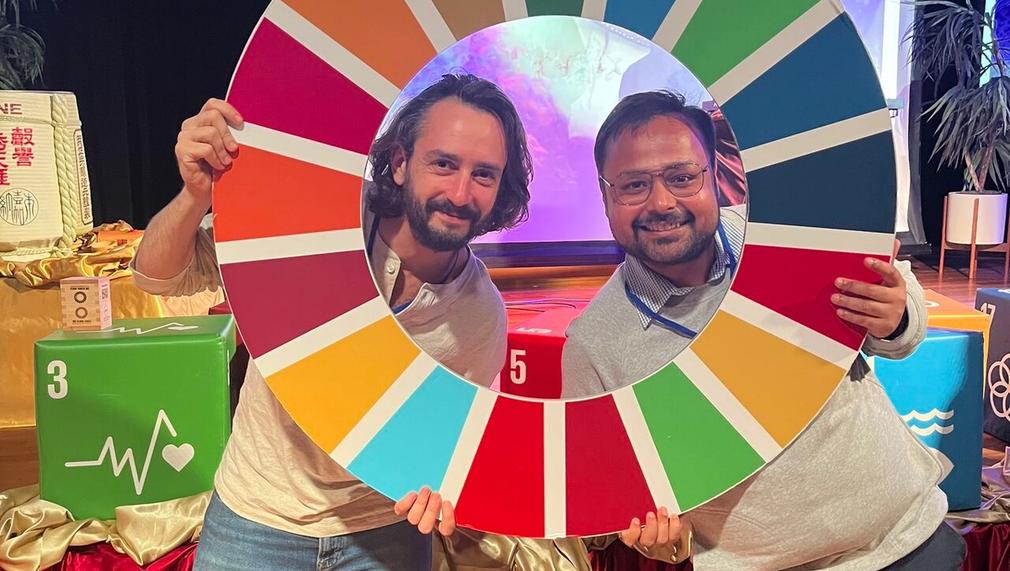Reducing Microplastics Pollution through Circular Solutions
Moby is on a mission to prevent toxic microplastics from polluting the environment and our bodies. Our sustainable filters trap microplastics from textile processing and commercial laundry practices. Moby has established a strategic partnership with the City of LA Sanitation & Environment to install and test our prototypes in a pilot across Angelino businesses (see support letter).

What is the primary issue area that your application will impact?
Access to tech and creative industry employment
In what stage of innovation is this project, program, or initiative?
Pilot or new project, program, or initiative (testing or implementing a new idea)
What is your understanding of the issue that you are seeking to address?
Microplastics are minuscule plastic particles that harm human health and the planet. Found everywhere, most microplastics are released from clothes during laundry and textile processing. On average, we ingest the weight of a credit card in plastic weekly, with disadvantaged communities disproportionately affected. These frontline communities face higher illness rates linked to microplastics and have limited access to health resources.
We address this by capturing and reusing particles from polluting businesses. Our B2B technology is simple, holistic, affordable, and promises long-term local and global impact. Our approach safeguards nature, human health, and frontline communities. The LA pilot challenges linear practices, raises awareness, promotes circular economy solutions that are holistic, ecological, and socially just, and creates tech and creative industry jobs for local communities.
Describe the project, program, or initiative this grant will support to address the issue.
Moby is targeting regions where polluting industries overlap with legislation, forming a strategic partnership with the City of LA Sanitation & Environment (LASAN) to test advanced closed-loop filters in Angelino businesses, focusing on small/medium industrial users (discharges under 25,000 gpd). Main objectives include: Collaborate with LASAN to design filters capturing microfibers and PFAS from commercial washers
Conduct lab studies and field assessments to analyze microfiber characteristics, quantify release during laundering, and measure environmental impact
Evaluate pollution reduction by comparing environmental footprints before and after filter implementation
Promote recycling and reuse of materials, minimizing waste generation, and enhancing resource efficiency
Develop a plan for responsible disposal or recycling of end-of-life filters
Educate the public on microfiber pollution risks and the benefits of using closed-loop filters
Encourage support for businesses adopting sustainable laundering practices The $300k pilot will be executed in two stages: Stage 1: Install and test filters, establish a laundromat HQ with R&D, a circular takeback system, and an educational program
Stage 2: Publish a white paper with LASAN to assess environmental impact and inform legislators LA2050 funds will support the pilot, enabling us to onboard up to two businesses. This collaboration aims to create a sustainable impact on LA's environment and serve as a model for other communities.
Describe how Los Angeles County will be different if your work is successful.
As a mission-driven startup, we are always guided by our social impact strategy. We aim to increase access to technology, provide job and educational opportunities, and build community partnerships while protecting nature and human health in order to help generate a healthier LA. By establishing a facility as an open laundromat/R&D lab in LA, we will be able to develop solutions that improve Angelino’s well-being while creating job opportunities with transferable skills. Moby's 5-year vision for LA includes key goals that will help Angelinos across the county: Protecting urban and natural ecosystems The air we breath and the water we drink will be cleaner reducing the health effect of microplastics pollution Hire locally for LASAN pilot and prioritize LASAN HBCU intern program Establish an operating laundromat HQ with R&D, a circular takeback system, and an educational program
Increase public knowledge and awareness by hosting field trips and collaborating with local communities
What evidence do you have that this project, program, or initiative is or will be successful, and how will you define and measure success?
Moby's technology is simple, holistic, and with potential for long-term impact. Since microfiber impact is so vast, our innovation tackles climate change, ecotoxicity, biodiversity loss, polluted water and air, and reduced ecosystem services. We have led a team in collaboration with Net Impact to create a GHG inventory, measure carbon footprint, and assess all environmental impact when Moby is at scale. Scopes included damage to the ocean carbon pump, GHG emissions from decomposition/landfilling, and degraded water, air, soil. In our pilot, we will measure success through analysis and quantification. Metrics include: Analyzing the characteristics of laundering microfibers
Quantifying the amount of microfibers captured Assessing the environmental impact of microfiber pollution
Measuring the reduction percentage of microfiber pollution achieved through our closed-loop filters
Comparing the environmental footprint before and after implementing our filters to evaluate their effectiveness
Describe the role of collaborating organizations on this project.
LASAN will: Collaborate with Moby on product development, testing, and refinement of closed-loop filters
Assist with the implementation of the filters in participating businesses
Connect Moby to businesses to facilitate the testing of their products
Provide technical support to businesses during the testing phase
Support to evaluate the performance and effectiveness of the closed-loop filters
Contribute to progress reports and case studies showcasing the positive impact of the filters
Publish a research paper outlining the objectives, methodologies, and expected outcomes
Seek grant opportunities and partnerships
Conduct laboratory studies and impact assessments on microfiber characteristics, pollution levels, and potential risks See attached support letter for more information.
Approximately how many people will be impacted by this project, program, or initiative?
Direct Impact: 1,000.0
Indirect Impact: 50,000.0